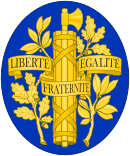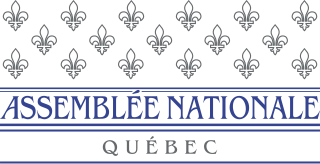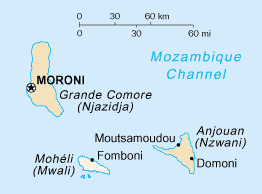 |
|---|
Elections to the National Assembly of France were held in Algeria on 22 September 1889. [1]
 |
|---|
Elections to the National Assembly of France were held in Algeria on 22 September 1889. [1]
| Département | Candidate | First round | Second round | Notes | ||
|---|---|---|---|---|---|---|
| Votes | % | Votes | % | |||
| Algiers | Alfred Letellier | 3,568 | 45.8 | 4,213 | 55.3 | Elected |
| Blasselle | 1,686 | 21.6 | – | – | – | |
| Fallet | 1,163 | 14.9 | – | – | – | |
| de Redon | 1,036 | 13.3 | – | – | – | |
| Soulery | 338 | 4.3 | – | – | – | |
| Paul Samary | – | – | 3,408 | 44.7 | – | |
| Invalid/blank votes | – | 147 | – | – | ||
| Total | 7,791 | 100 | 7,768 | 100 | – | |
| Constantine | Gaston Thomson | 4,723 | 66.3 | – | – | Elected |
| Sterlin | 1,526 | 21.4 | – | – | – | |
| Noireterre | 873 | 12.3 | – | – | – | |
| Invalid/blank votes | – | – | – | – | ||
| Total | 7,122 | 100 | – | – | – | |
| Oran | Marcel Saint-Germain | 4,274 | 65.2 | – | – | Elected |
| Other candidate | 2,278 | 34.8 | – | – | – | |
| Invalid/blank votes | 184 | – | – | – | – | |
| Total | 6,736 | 100 | – | – | – | |
| Source: Sternberger et al., National Assembly of France. [2] [3] | ||||||
| Département | Candidate | Votes | % | Notes |
|---|---|---|---|---|
| Algiers | Charles Bourlier | 5,283 | Elected | |
| M Samary | 3,328 | – | ||
| Invalid/blank votes | – | – | ||
| Total | – | |||
| Constantine | Dominique Forcioli | 4,029 | 69.6 | Elected |
| Others | 1,763 | 30.4 | – | |
| Invalid/blank votes | 314 | – | – | |
| Total | 6,106 | 100 | – | |
| Oran | Eugène Etienne | 5,949 | 87.7 | Elected |
| Leglay-Mauvrac | 617 | 9.1 | – | |
| Other | 214 | – | – | |
| Total | 6,780 | 100 | – | |
| Source: Sternberger et al., National Assembly of France [4] [5] | ||||

Louis-Eugène Cavaignac was a French general and politician who served as head of the executive power of France between June and December 1848, during the French Second Republic.

The National Assembly of Quebec is the legislative body of the province of Quebec in Canada. Legislators are called MNAs. The King in Right of Quebec, represented by the lieutenant governor of Quebec and the National Assembly compose the Legislature of Quebec, which operates in a fashion similar to those of other Westminster-style parliamentary systems. The assembly has 125 members elected first past the post from single-member districts.

Camillien Houde was a Quebec politician, a Member of Parliament, and a four-time mayor of Montreal. He is of the few Canadian politicians to have served at all three levels of government.

The Senate is the upper house of the French Parliament, with the lower house being the National Assembly, the two houses constituting the legislature of France. The French Senate is made up of 348 senators elected by part of the country's local councillors, as well as by representatives of French citizens living abroad. Senators have six-year terms, with half of the seats up for election every three years.

Jean-Paul L'Allier was a Quebec politician, a two-term Member of the National Assembly of Quebec (MNA) and the 38th mayor of Quebec City.

Mohéli[mɔ.e.li], also known as Mwali, is an autonomous island that forms part of the Union of the Comoros. It is the smallest of the three major islands in the country. It is located in the Indian Ocean off the coast of Africa and it is the smallest of the four major Comoro Islands. Its capital and largest city is Fomboni.

John Henry Pope, was a Canadian farmer, lumberman, railway entrepreneur, and politician.

The Executive Commission of 1848 was a short-lived government during the French Second Republic, chaired by François Arago, that exercised executive power from 9 May 1848 to 24 June 1848. It succeeded the Provisional Government of 1848 and was in turn replaced by the Cabinet of General Cavaignac. The members of the Commission acted as joint head of state.

The 1888–89 United States Senate elections were held on various dates in various states, coinciding with Benjamin Harrison's victory over incumbent President Grover Cleveland. As these U.S. Senate elections were prior to the ratification of the Seventeenth Amendment in 1913, senators were chosen by state legislatures. Senators were elected over a wide range of time throughout 1888 and 1889, and a seat may have been filled months late or remained vacant due to legislative deadlock. In these elections, terms were up for the senators in Class 2.
The fourth Parkes ministry was the 24th ministry of the Colony of New South Wales, and was led by the seventh Premier, Sir Henry Parkes. It was the fourth of five occasions that Parkes was Premier.

The fifth Parkes ministry was the 26th ministry of the Colony of New South Wales, and was led by the seventh Premier, Sir Henry Parkes. It was the fifth and final occasion that Parkes was Premier. The title of Premier was widely used to refer to the Leader of Government, but was not a formal position in the government until 1920. Instead the Premier was appointed to another portfolio, usually Colonial Secretary. Having served in the New South Wales Legislative Council between 1854 and 1856, Parkes was elected in the first free elections for the New South Wales Legislative Assembly held in 1856, however resigned from Parliament later that year. He served in the Assembly on several occasions, between 1858 and 1870, being forced to resign on 4 occasions due to his personal insolvency. He came to power as Premier on the first occasion in 1872, serving as Premier for a period of three years. However, Parkes lost the confidence of the Assembly following Governor Robinson's decision to release of the bushranger Frank Gardiner led to the defeat of the ministry in 1875.

The second Dibbs ministry was the 25th ministry of the Colony of New South Wales, and was the second of three occasions of being led by the tenth Premier, George Dibbs. Dibbs was elected to the New South Wales Legislative Assembly in 1874. In a period of great financial stress for the Colony, this ministry covers just 49 days from 17 January 1889 until 7 March 1889. Dibbs took over as Premier on the first occasion in October 1885 following resignation of the Alexander Stuart due to ill-health, with his ministry lasting for 75 days. Dibbs served as Colonial Secretary in the Jennings ministry, before it too suffered budgetary pressures. It was during this time that the party system was formed in New South Wales with Sir Henry Parkes leading the Free Trade Party. Dibbs had been elected as an independent free trader, however his opposition to Parkes caused Dibbs to align himself with the Protectionist Party. Dibbs had assumed office when Parkes lost a vote on the floor of the Assembly. Parliament was dissolved on 19 January 1889 and an election was held in February. There was a significant swing to the Protectionists, gaining 29 seats, however it was insufficient to command a majority of the Legislative Assembly and Parkes resumed the premiership.
Parliamentary elections were held in Serbia on 26 September 1889. The result was a victory for the People's Radical Party, which won 102 of the 117 seats in the National Assembly.

Gippsland North was an electoral district of the Legislative Assembly in the Australian state of Victoria located in northern Gippsland from 1859 to 1955.

Pierre Magne was a lawyer and French politician. He was a member of parliament from 1843 to 1848, a senator in the Second French Empire, and a representative and then senator in the French Third Republic. He was Minister of Finance several times.
François-Xavier Joseph de Casabianca was a French aristocrat, lawyer and politician who served as minister of agriculture and commerce, minister of finance, and president of the council of state in the government of Louis Napoleon.

François Henri René Allain-Targé was a French politician of the French Third Republic. He served as Minister of finance under Léon Gambetta and Minister of the interior under Henri Brisson.
Baniapukur Ballygung Assembly constituency was a Legislative Assembly constituency of Kolkata district in the Indian state of West Bengal.
Legislative elections in France determine who becomes Members of Parliament, each with the right to sit in the National Assembly, which is the lower house of the French Parliament.